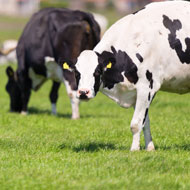
Scientists find 913 diverse microbes in cows’ rumen
New analysis of the microbes in cows’ stomachs could help to boost meat and milk production, scientists say.
A research team from the Roslin Institute and Scotland’s Rural College (SRUC) studied samples of rumen gut contents from 43 cows.
According to findings in Nature Communications, 913 diverse strains of microbes were found in the rumen. Scientists say most of these microbes have never been seen before and they could have potential uses in the biofuels and biotechnologies industries.
Researchers used metagenomics to analyse the genetic composition of the microbes, which allowed them to pinpoint previously unknown enzymes that can extract every and nutrition from plant material.
As beef and dairy cattle provide food and nutrition to billions of people worldwide, understanding how they convert plant-based diets into energy is key to securing future world food supplies, scientists say.
Professor Mick Watson, of the Roslin Institute, said: “This has been a truly fascinating study, and really we are only beginning to understand what these microbes do. The fact most of them were very different to microbes that have already been discovered surprised us, so we just can’t wait to study them further.
“If we can improve the efficiency of digestion in cows and other ruminants, we may be able to produce more food for people whilst using fewer resources. This is a key aim of improving global food security.”
Professor Rainer Roehe, from the SRUC, added: “The newly identified microbial species in the rumen of beef cattle will greatly improve our understanding of how the rumen microbial ecosystem works.
"Using breeding and nutritional interventions, we will be able to use this information to help improve cattle health and performance throughout the world.”



 The Veterinary Medicines Directorate (VMD) is inviting applications from veterinary students to attend a one-week extramural studies (EMS) placement in July 2026.
The Veterinary Medicines Directorate (VMD) is inviting applications from veterinary students to attend a one-week extramural studies (EMS) placement in July 2026.